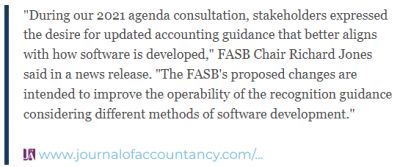- within Law Department Performance, Environment and Energy and Natural Resources topic(s)
- with readers working within the Technology industries
The FASB's proposal to update the accounting standards for internal-use software development couldn't have come at a better time. Agile software development has completely changed how companies build and implement technology, and the old rules just don't reflect that anymore. By scrapping the outdated, sequential stages like the preliminary project stage and application development stage, the new guidance is a step toward simplifying the process. It's also great to see the FASB align internal-use software rules more closely with those for externally marketed software—this consistency is a win. But here's the catch: the new "probable-to-complete recognition threshold" and the concept of "significant development uncertainty" are going to require a lot of judgment, and that's where things get tricky.
This new guidance won't just be a plug-and-play change—it's going to demand real thoughtfulness from accounting and finance teams. Determining when to capitalize costs based on whether there's "significant development uncertainty" involves a lot of gray area, like evaluating novel functionality or shifting performance requirements. It's not hard to imagine companies approaching this differently, which could lead to inconsistencies. To get ahead of this, accounting teams need to start thinking now about how they'll document and support their decisions. Coordination with IT and strong project management will also be key to navigating these changes. Bottom line: while this update is sorely needed, it's going to require careful planning to get it right when the time comes.
The content of this article is intended to provide a general guide to the subject matter. Specialist advice should be sought about your specific circumstances.



